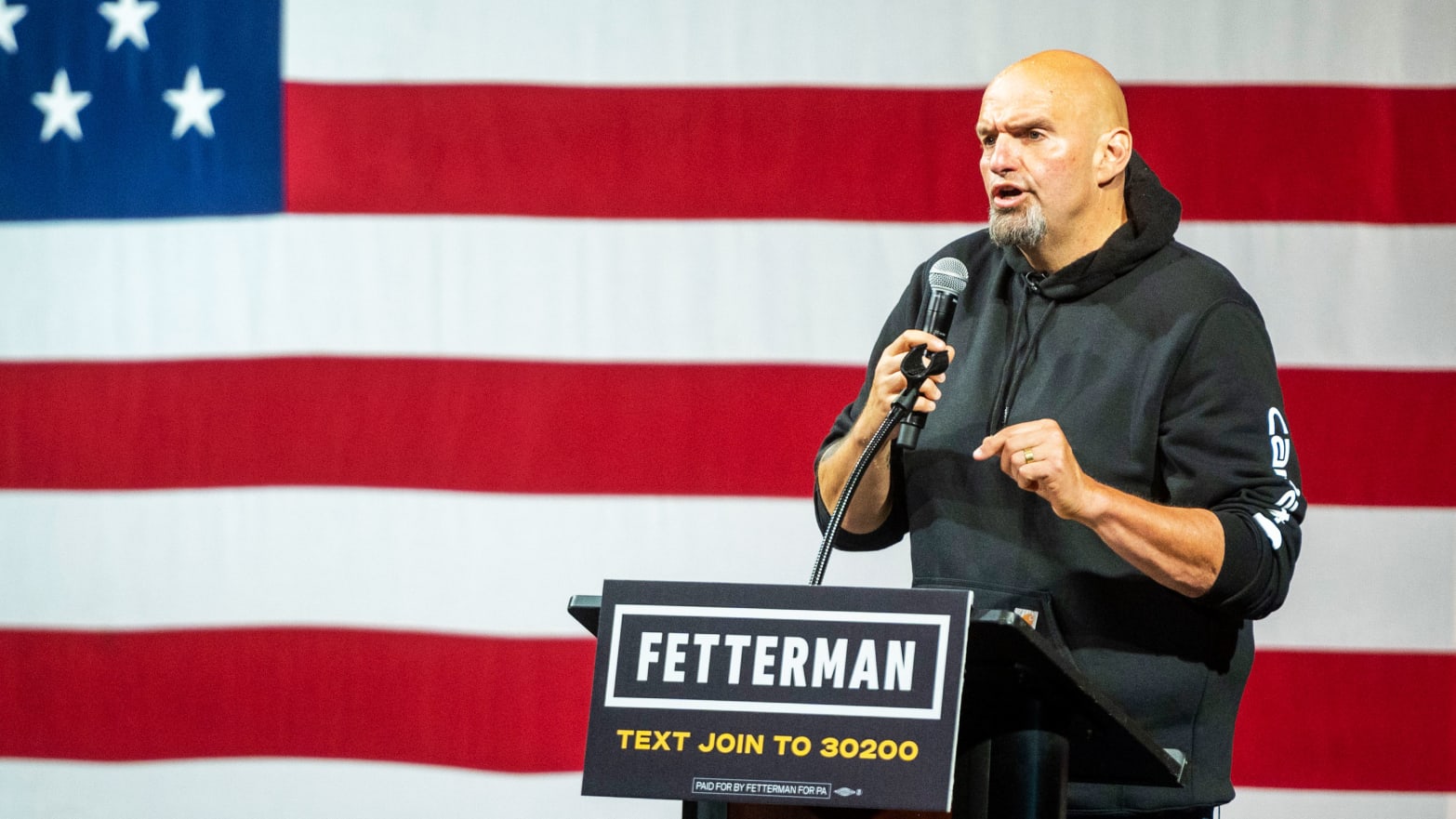He suffered a massive stroke that knocked him off the campaign trail, has until this week refused to agree to a debate, and has rarely been seen in public. He’s also the frontrunner for a much-coveted U.S. Senate seat in a crucial swing state.
I’m talking, of course, about John Fetterman, the Democratic nominee for the U.S. Senate in Pennsylvania, who “almost died” from a stroke that has kept him from actively campaigning for nearly three months. Videos circulating show Fetterman’s ability to verbally communicate is less than 100 percent.
Fetterman—who acknowledges “lingering issues of the stroke,” including “auditory processing” problems—already opted out of a September debate, but finally agreed to a single debate with his Republican opponent, Dr. Mehmet Oz. While he still won’t specify exactly when this debate will take place, presumably, it’ll be before the election in less than two months. Should it actually happen, however, Fetterman says he might need to use a closed captioning monitor.
It might not surprise you to learn that Democrats are suggesting Fetterman shouldn’t have to debate at all. “[W]hy should he help Oz’s campaign?” asks Sen. Jeanne Shaheen of New Hampshire. Sen. Gary Peters of Michigan concurred, adding that bringing up Fetterman’s health “shows desperation.”
Conversely, retiring Republican Sen. Pat Toomey—the man Fetterman hopes to replace—says Fetterman’s “not up to the job.” But just as Toomey’s diagnosis should be taken with a grain of salt, Shaheen and Peters’ rooting interests are obvious.
The reality is that Fetterman’s health is a legitimate issue. Voters deserve vigorous debates between candidates for office. And one should be able to respectfully express concerns or ask questions about Fetterman’s health without being labeled a hack or an “ableist.”
Not surprisingly, Democrats are circling the wagons. What is more interesting is that the national media’s coverage of Fetterman’s health has often been presented in the context of the “Republicans pounce” genre. This is to say that worries about Fetterman’s health are primarily voiced by Oz or his fellow Republicans as if only someone who is rooting for Oz would have any reason for taking an interest in the physical capabilities of a would-be U.S. Senator to perform their duties.
In fairness, there are exceptions, particularly at the local level. For example, the Pittsburgh Post-Gazette editorialized: “Voters have a right to know whether their prospective senator can do the job—including handling the give-and-take of a vigorous debate.”
Remember, we are talking about an election to a term that would last for six years. Fetterman would join a powerful club (just 100 members), but the Pennsylvania election could also decide which party controls the upper chamber of Congress.
Indeed, the high stakes might help explain why some observers hesitate to make a big deal about Fetterman’s health. Back in 2016, after Hillary Clinton lost, there was some regret over the coverage of her fainting (I thought the coverage was fair); there was a sense that the concerns about her health—much like the “But her emails!” coverage—boosted Donald Trump. Four years later, this regret may have contributed to the media’s lack of interest in covering Hunter Biden’s laptop.
In some quarters of the media, there may be a sense that covering Clinton or Biden or Fetterman too skeptically is equivalent to enabling “semi-fascism.”
Now, I think it’s a legitimate critique to say that journalists can sometimes make too big a deal out of scandals and health scares which are, after all, more fun (and easier to understand) than policy. But the coverage shouldn’t be contingent on which side of the aisle is helped or hurt by it.
Let’s imagine if the shoe was on the other foot. If Dr. Oz was off the campaign trail for two or three months—and had demurred invitations to debate—what do you think the coverage would be like? I suspect you might, by now, have heard calls for him to drop out of the race.
We have all seen the sort of blue checkmark Twitter jokes about Donald Trump’s weight and appearance—and we have all scoffed at the notion that Trump was “the healthiest individual ever elected to the presidency” who aced a cognitive test (“person, woman, man, camera, TV”).
Trump is a serial prevaricator, but shouldn’t there be a similar degree of skepticism toward any politician seeking high office after suffering a severe health scare? After all, Fetterman knew he had a heart condition back in 2017, yet did not disclose it until after his stroke.
Again, we should expect Democrats to circle the wagons. That’s what partisans do. But the moral incentive for the media should be to give readers and voters more information—while the financial incentive should be to root for the story.
So far, I’m not seeing much of either. John Fetterman owes the people of Pennsylvania a few debates.

